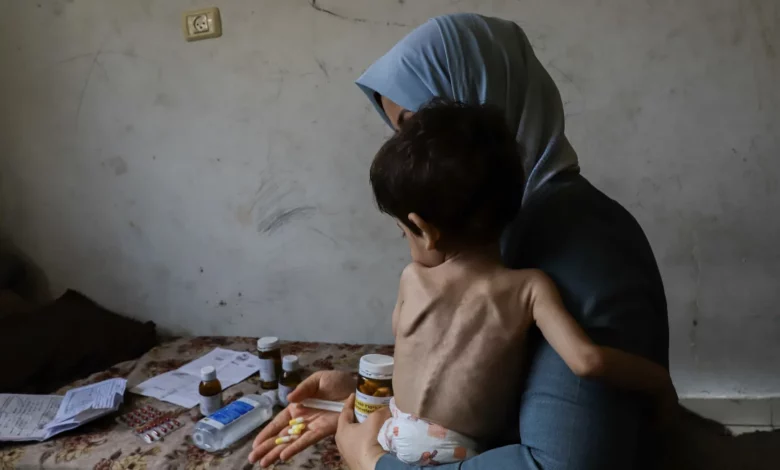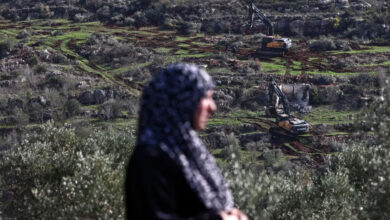
“A high risk of famine persists across the whole of the Gaza Strip as long as conflict continues and humanitarian access is restricted,” the report said. “Only the cessation of hostilities in conjunction with sustained humanitarian access to the entire Gaza Strip can reduce the risk of a famine occurring in the Gaza Strip.”
The report projects that 96 percent of the population of Gaza – more than 2 million people – will face crisis, emergency, or catastrophic levels of food insecurity through at least the end of September. Nearly half a million are projected to face catastrophic levels, the most severe level on the IPC scale where people “experience an extreme lack of food, starvation, and exhaustion of coping capacities.”
The findings of the report echo testimonies from those on the ground about the dire humanitarian catastrophe in Gaza. Nearly nine months of Israel’s bombardment and siege have depleted the health care system, battered water infrastructure and created dire conditions for the entire population of more than 2.2 million people.
Increased Israeli attacks in the southern city of Rafah have triggered mass displacement and an outbreak of infectious diseases in the sprawling tent camps where people cannot access basic sanitation. With no signs of an imminent ceasefire being agreed to stop the fighting, relief workers say the suffering of civilians on the ground will only get worse.
“The latest data shows that, to be able to purchase food, more than half of the households had to exchange their clothes for money and one third resorted to picking up trash to sell,” the report detailed. “More than half also reported that, often, they do not have any food to eat in the house, and over 20 percent go entire days and nights without eating.”
The report acknowledged there were some improvements to the situation in the north of Gaza, where the IPC warned in March that famine was imminent. Tuesday’s report assessed that an increase in food deliveries in March and April appears “to have reduced the severity and magnitude of acute food insecurity and malnutrition, likely averting a famine in the northern governorates.”
Although there was also some improvement in the south of Gaza in that time, the report said, the situation deteriorated with the launch of Israel’s military operations in Rafah. The Rafah crossing – a key transitway for humanitarian aid to Gaza – has been closed since early May, and only a handful of other land crossings remain open. Humanitarian aid workers continue to face tremendous risks to try to distribute the desperately needed aid to Gaza. The majority of the infrastructure to support humanitarian work in Gaza has been destroyed in Israel’s war against Hamas.
“The humanitarian space in the Gaza Strip continues to shrink and the ability to safely deliver assistance to populations is dwindling,” the report said. “The recent trajectory is negative and highly unstable. Should this continue, the improvements seen in April could be rapidly reversed.”
The United States, Israel’s closest ally, has repeatedly called on the Netanyahu government to do more to address the humanitarian crisis in Gaza. US President Joe Biden warned in early April that Israel had to take immediate concrete steps or risk changes in US policy. Thus far, there have been no such changes in policy.
“We have seen them take steps that have been productive,” State Department spokesperson Matthew Miller said last week. “When we see reports from humanitarian groups, say, the IPC that issues reports from time to time, we will take a look at those. And if there are things that need to change, we won’t hesitate to be direct with Israel about how they need to make those changes. But we have seen an improvement in the aid situation going in, in the north, and we have seen somewhat of a stagnation in the south. And that’s what we want to see reversed.”
Meanwhile, humanitarian workers are warning that the situation in Gaza is untenable.
“In the north, when we raised the famine alarm, we were able to get some more trucks in. And so for the moment, it is better. Not great — I don’t want to give false illusions here that this is all hunky dory, because it’s not,” said World Food Programme Director Cindy McCain. “There’s still great need in the north, and it’s complex. It’s complex for this reason. It’s not just food they need. They need water, they need sanitation, they need health care. All of those things contribute to famine.”
A humanitarian official told CNN, “I think we’re going to very rapidly be back on the sort of trajectory that we were seeing in north. The scale will be much larger because it was 300,000 people give or take in northern Gaza. It’s one and a half to 1.8 million people now in the southern middle areas who are in similar boat.”
Kate Phillips-Barrasso, of Mercy Corps, added, “The population cannot endure these hardships any longer. The toll of military action has been far too high, and we fear without dramatic changes to the provision of humanitarian aid, the death toll will climb as people succumb to months of deprivation.
“The humanitarian situation is deteriorating rapidly, and the specter of famine continues to hang over Gaza,” Phillips-Barrasso told CNN. “Despite some aid getting in, the glaring contradictions remain. Commercial trucks are allowed passage, yet humanitarian aid is limited, scrutinized at the border, and, when permitted to cross, typically only reaches some city centers without proper security.”
“Compounding the suffering is oppressive summer heat, no access to clean water, and increasing exposure to garbage and sewage. This lethal equation will undoubtedly lead to acute suffering and mortality,” she said.
On Friday, the commissioner-general for the UN’s agency for Palestinia refugees (UNRWA), Philippe Lazzarini, urged the “uninterrupted, regular, coordinated and meaningful flow of humanitarian assistance.”
This story has been updated.




